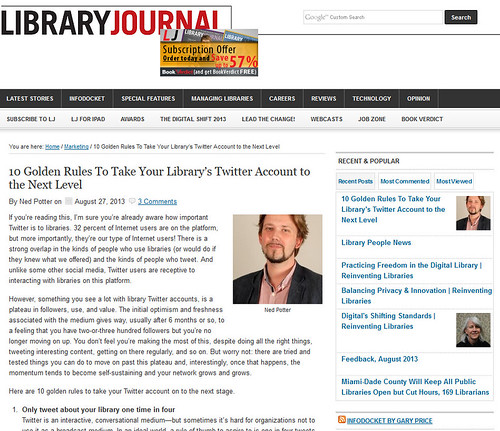Here's a new set of slides I've just uploaded to my Library's slideshare account:
from
I think the key to good feedback in a workshop is probably 10% about the content, 10% about the delivery, and 80% about whether it is pitched at the level the participants expect and require. That's probably an exaggeration but you get my point. I've blogged on here before about how I run sessions around Web 2.0 and academia for the Researcher Development Team at York, and in the last couple I've really felt for a small number of participants who were at a stage beyond the level I was pitching at. The workshops are introductions so participants literally set up, for example, a Twitter account from scratch - so anyone who is already past that point but wants to know about content and tone, is doing far too much thumb-twiddling for my liking, until later in the session.
With all that in mind, as of next academic year we're reworking the workshops, and in each case I'll run one 'A beginner's guide to' type session and one 'Improvers' type session, so people can get exactly what they need out of the workshops. We didn't have time to arrange that for this terms' workshops, so I produced the slides above to send on to participants of my introductory workshop, for those who wanted to go further. In January when the next set of workshops run (I don't do any in the Autumn term, because AUTUMN TERM), I'll flesh this out into a proper interactive 1.5 hour session.
Have I left anything important out? One of the things I love about Slideshare is that you can update and reupload slides over the same URL, so you don't lose that continuity (and your statistics). So if there's anything you'd add to this, let me know in a comment, and I can eventually make a new and improved version to put online in place of this one.
My advice to Tweeters: ignore advice to Tweeters...
I think guides for tweeting well are most important for organisations - it's key that companies, businesses and public bodies get this stuff right, and they often don't. For individuals though, I'm increasingly of the mind that unless you specifically want Twitter to DO something for you which it currently isn't doing (and the slides above are aimed at researchers who specifically want to grow their network in order to find more value in it), it's not worth reading 'how to tweet' guides (of the kind I used to write myself) and trying to change how you approach it. There's plenty of good advice to be had in these, but it's not necessary to follow any of it - apart from not being unpleasant or otherwise making people bad about themselves. If you want to tweet about your lunch every day, why should you stop doing that just to retain followers? I think it's better to be yourself and have a group of followers who are prepared to put with that, for better or for worse...
Number of followers isn't an end in itself. A smaller group of engaged followers who want to interact with YOU is far better than a huge group for whom you have to put on any kind of show. So while when writing in print it's important to adopt a style appropriate for the medium, I consider Twitter to be much closer to spoken communication. As long as you're prepared to deal with the consequences, why not just be yourself?


